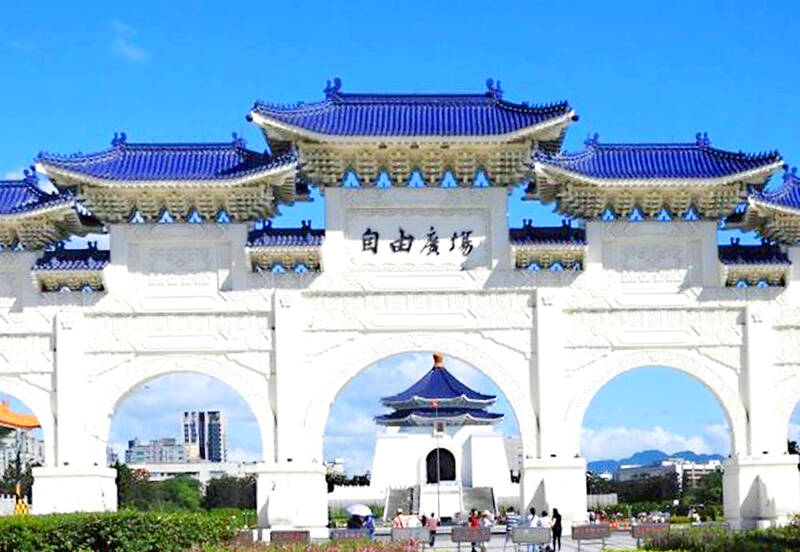The government has no immediate plans to demolish the Chiang Kai-shek Memorial Hall as part of transitional justice efforts, but it is focused on removing symbols of authoritarianism, Premier Chen Chien-jen (陳建仁) said yesterday.
Chen was responding to a question on whether the government planned to tear down the controversial memorial site before a new president takes office on May 20 next year.
In an opinion piece published on Sunday in the Chinese-language Liberty Times (the Taipei Times’ sister newspaper), members of a Cabinet-level task force seeking ways to repurpose the hall — former political prisoner Lu Yu (呂昱), National Taiwan University associate professor Huang Shu-mei (黃舒楣) and former Transitional Justice Commission member Yeh Hung-ling (葉虹靈) — said that little progress has been made on the issue due to a lack of political will.

Photo: Photo: Chen Yu-fu, Taipei Times
“In pursuit of transitional justice, it is crucial to remove symbols of authoritarian regimes and stop promoting a cult of personality. A task force has been established to study alternative uses of the Chiang Kai-Shek Memorial Hall, and President Tsai Ing-wen (蔡英文) has also expressed hope that the government would make progress on the matter before her term ends next year,” Chen said.
“Discussions over repurposing the Chiang Kai-Shek Memorial Hall are comprehensive and ongoing, and we have yet to draw a conclusion that the architecture would be torn down soon... We would gather input from all stakeholders and look into relevant issues, and any progress made in that regard would be announced,” he said.
Separately, Vice Premier Cheng Wen-tsan (鄭文燦) said that the Executive Yuan is exploring a few options, but a plan would not be announced until a consensus has been reached.
The task force was formed to address various issues, such as how to remove symbols of authoritarianism and cult of personality, and what to do with the spaces once they are removed, Cheng said.
The Executive Yuan is amending laws related to transitional justice, such as the Political Archives Act (政治檔案條例), and proposing an act governing the preservation of sites where injustices occurred, he said, adding that they would be announced following a careful review.
Executive Yuan spokesman Lin Tze-luen (林子倫) on Sunday said that the transformation of the Chiang Kai-Shek Memorial Hall is the cornerstone of the Cabinet’s transitional justice efforts and requires comprehensive planning.
“We thank the three task force members for raising their concerns about the progress made on the matter. We will continue gathering opinions, consolidate positions of government agencies and consider all possible ramifications in the most cautious manner possible,” Lin said. “We are also seeking the best opportunities to pursue transitional justice.”
Cheng and Minister Without Portfolio Lo Ping-cheng (羅秉成) presided over the task force’s meetings, he said, adding that Minister of Culture Shih Che (史哲) and Minister of the Interior Lin Yu-chang (林右昌) also participated.
The Executive Yuan’s determination to pursue transitional justice is no different from three task force members who wrote the op-ed, he said.
Following a meeting in May, the task force asked the Ministry of Culture to propose options for repurposing the Chiang Kai-Shek Memorial Hall and to communicate with the public about them, he said.

Travel agencies in Taiwan are working to secure alternative flights for travelers bound for New Zealand for the Lunar New Year holiday, as Air New Zealand workers are set to strike next week. The airline said that it has confirmed that the planned industrial action by its international wide-body cabin crew would go ahead on Thursday and Friday next week. While the Auckland-based carrier pledged to take reasonable measures to mitigate the impact of the workers’ strike, an Air New Zealand flight arriving at Taipei from Auckland on Thursday and another flight departing from Taipei for Auckland on Saturday would have to

The manufacture of the remaining 28 M1A2T Abrams tanks Taiwan purchased from the US has recently been completed, and they are expected to be delivered within the next one to two months, a source said yesterday. The Ministry of National Defense is arranging cargo ships to transport the tanks to Taiwan as soon as possible, said the source, who is familiar with the matter. The estimated arrival time ranges from late this month to early next month, the source said. The 28 Abrams tanks make up the third and final batch of a total of 108 tanks, valued at about NT$40.5 billion

A group from the Taiwanese Designers in Australia association yesterday represented Taiwan at the Midsumma Pride March in Melbourne. The march, held in the St. Kilda suburb, is the city’s largest LGBTQIA+ parade and the flagship event of the annual Midsumma Festival. It attracted more than 45,000 spectators who supported the 400 groups and 10,000 marchers that participated this year, the association said. Taiwanese Designers said they organized a team to march for Taiwan this year, joining politicians, government agencies, professionals and community organizations in showing support for LGBTQIA+ people and diverse communities. As the first country in Asia to legalize same-sex

MOTIVES QUESTIONED The PLA considers Xi’s policies toward Taiwan to be driven by personal considerations rather than military assessment, the Epoch Times reports Chinese President Xi Jinping’s (習近平) latest purge of the Chinese People’s Liberation Army (PLA) leadership might have been prompted by the military’s opposition to plans of invading Taiwan, the Epoch Times said. The Chinese military opposes waging war against Taiwan by a large consensus, putting it at odds with Xi’s vision, the Falun Gong-affiliated daily said in a report on Thursday, citing anonymous sources with insight into the PLA’s inner workings. The opposition is not the opinion of a few generals, but a widely shared view among the PLA cadre, the Epoch Times cited them as saying. “Chinese forces know full well that